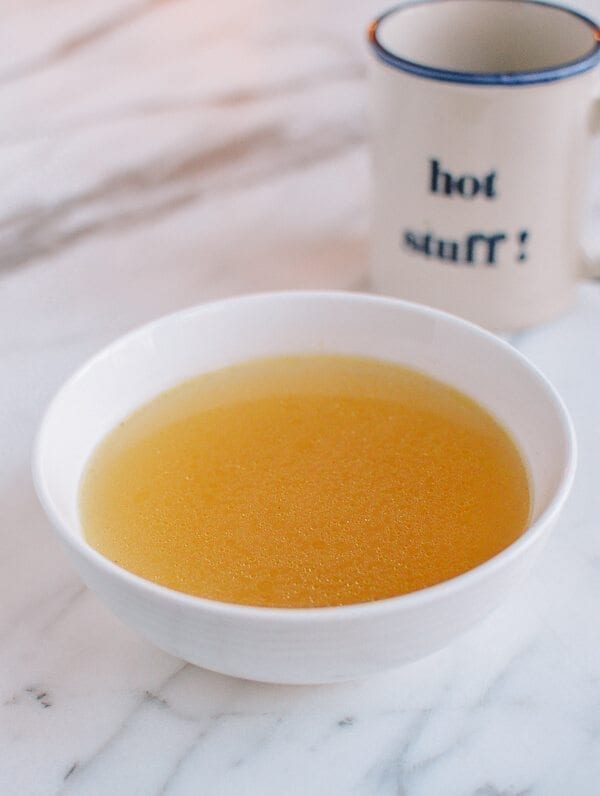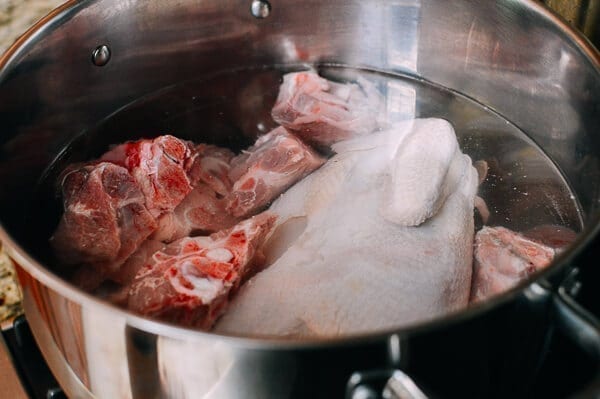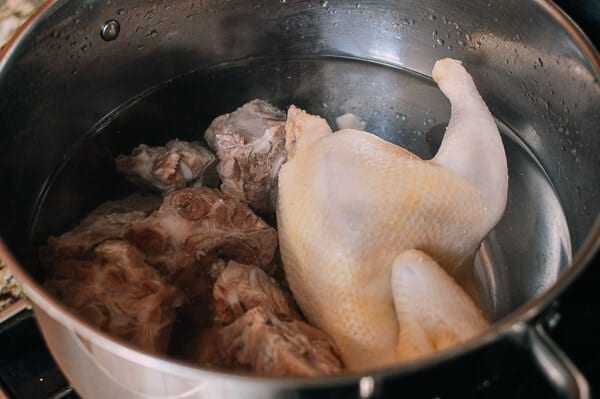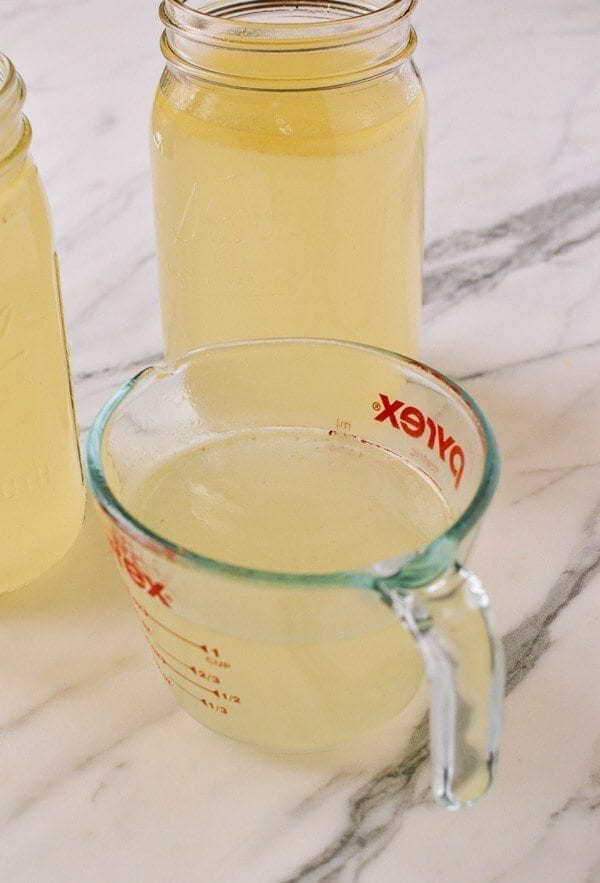How Clear Should Beef Broth Be
How to Make a Clear Broth

Just because a clear broth or stock looks almost as clear as water, trust me, it should be far from tasteless.
We have already posted recipes for simple clear broths that can be used in recipes or consumed on their own, such as my chicken stock recipe , my pork & chicken stock , and Sarah's Asian vegetable stock .
But why would you want to make a clear broth? If you're making hot and sour soup, or using broth in a stir-fry sauce, the need for a clear broth is less critical. However, if you want a bowl of classic wonton soup or a noodle soup, the clarity in the broth will make the dish look right.
We've had many questions from readers on how to make a clear broth, so we're writing up this definitive post to explain. It's not hard to achieve when you're aware of two key elements:
- The proper preparation of ingredients
- Simmering temperature

What's the Difference Between Broth & Stock?
Before we get into the meat of this article, let's quickly clarify terminology.
The main difference between broth and stock is that broth is made with meat, while stock is primarily made with bones. Stock is often cooked longer than broth to extract the flavor from the bones.
There are some gray areas and overlap between the two types, so we tend to use the terms interchangeably. The guidelines below apply to making both stocks and broths, whether you're using meat, bones, or a combination of the two.
How to Prepare Ingredients to Make a Clear Broth
- If using meat in your stock or broth, you must soak it for at least 1 hour to get rid of excess blood and impurities. This includes chicken/chicken bones, pork/pork bones, and beef/beef bones, etc. Change the water out 1-2 times, and once soaked, thoroughly rinse clean.
- After soaking and washing, you must also blanch the meat/bones. Simply add the meat/bones to a pot along with enough cold water to fully submerge. Bring to a boil, and boil for 1 minute. Drain and rinse under clean running water.
- When vegetables are used, it's important not to cut them too small. It's best to keep them around 2 in/5 cm. Small pieces of vegetable will dissolve when simmered for a long time and make the soup cloudy. But don't worry, after 4-5 hours of simmering, the nutrients and flavor from the vegetables, no matter how big the pieces, will be cooked into your broth!


Proper Simmering Technique for a Clear Broth
- Always start with cold water along with all the ingredients in the pot. Once it's been brought to a boil, immediately turn down the heat to simmer. Stay close-by while waiting for it to boil so the soup does not have a chance to boil longer than that.
- Here's how you know if the stock is simmering at the right temperature: there should be a very slow bubbling from the stock. If there's absolutely no movement in the liquid, the heat is too low and the "cooking" is not happening. If the soup is bubbling quickly, there is too much disturbance in the liquid, and the stock will reduce faster and lose clarity.
- Be sure to simmer with the lid on!
It's that simple!
General Best Practices When Making Broth or Stock
- Do not stir the pot during the whole cooking process. Stirring will cause the ingredients to break down and cloud the broth.
- Stock/broth takes time to simmer. That means a minimum 2 hours, or ideally 4-6 hours to get all the flavors out.
- I know you're all wondering, so I'll address the Instant Pot question up front! You can make stock in an Instant Pot if you're pressed for time, but it's unlikely to be as clear when cooked under high pressure. If you have the time to simmer the stock on the stove, I'd recommend doing that instead.
- Always use a large stockpot that has a thick bottom. Liquid reduces much faster in thin bottomed pots and pans. In order to yield as much stock as possible, it's best to use a pot with a thick bottom and well-fitting lid to prevent too much liquid from evaporating.
- Always keep the lid on when simmering (again, to make sure it doesn't evaporate too much and to yield more stock).
- Salt the stock at the time of application/consumption.
- When the stock finishes cooking, turn off the heat and allow the stock to cool completely before straining and storing. Use clean utensils throughout this process. The stock will keep in the refrigerator for 5-7 days, and stay at best quality for up to 6 months in the freezer.
- When storing in the freezer, don't overfill the containers, as liquid will expand when frozen. Leave enough room for that expansion to happen!

More Recipes
We also have some great recipes to make with your clear broth!
- 20 Minute Chicken Pho
- Simple Wonton Soup
- San Xian Wonton Soup
- Egg Drop Soup
- Yang Chun Mian
- Shepherd's Purse & Tofu Soup
Check out more of our soup recipes, and enjoy more soup this winter!
- meat, bones, and or vegetables
- water
Preparing Ingredients:
-
Soak meat/bones for at least 1 hour to get rid of excess blood and impurities. This includes chicken/chicken bones, pork/pork bones, and beef/beef bones, etc. Change the water out 1-2 times, and once soaked, thoroughly rinse clean.
-
After soaking and washing, you must also blanch the meat/bones. Simply add the meat/bones to a pot along with enough cold water to fully submerge. Bring to a boil, and boil for 1 minute. Drain and rinse under clean running water.
-
When vegetables are used, it's important not to cut them too small. It's best to keep them around 2 in/5 cm. Small pieces of vegetable will dissolve when simmered for a long time and make the soup cloudy.
Simmering:
-
Always start with cold water along with all the ingredients in the pot. Once it's been brought to a boil, immediately turn down the heat to simmer. Stay close-by while waiting for it to boil so the soup does not have a chance to boil longer than that.
-
Here's how you know if the stock is simmering at the right temperature: there should be a very slow bubbling from the stock. If there's absolutely no movement in the liquid, the heat is too low and the "cooking" is not happening. If the soup is bubbling quickly, there is too much disturbance in the liquid, and the stock will reduce faster and lose clarity.
-
Be sure to simmer with the lid on!
Reader Interactions
Source: https://thewoksoflife.com/how-to-make-a-clear-broth/
0 Response to "How Clear Should Beef Broth Be"
Post a Comment